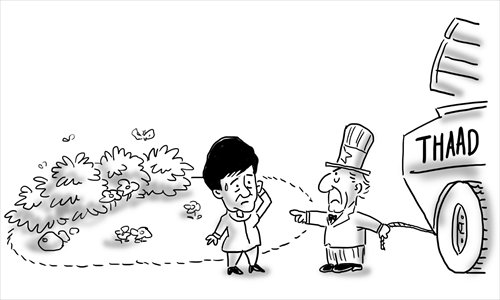THAAD would only worsen Korean tensions

Illustration: Shen Lan/GT
Since North Korea conducted the fourth nuclear test, the international community has reacted strongly and the UN Security Council is considering a new round of sanctions. US Secretary of State John Kerry on January 27 called North Korea's nuclear program a "major challenge to global security" after talking with Chinese Foreign Minister Wang Yi in Beijing.
Wang reiterated China's three principles on the issue, which include denuclearization on the Korean Peninsula, maintaining the peace and stability of the peninsula and seeking solutions through dialogue. China agrees that the UN Security Council should take further actions and adopt a new resolution, and stands ready to conduct in-depth consultations with the US and other parties in a responsible manner. But the new resolution should aim at pulling the North Korean nuclear issue back on the track of negotiations rather than destabilizing the peninsula.
South Korea has reacted unusually strongly to the latest nuclear test by its northern neighbor. The second day after the test, South Korean President Park Geun-hye held phone calls with her US counterpart Barack Obama over the response to North Korean move. Park and her Defense Minister Han Min-Koo both said that Seoul is considering deploying the Terminal High Altitude Area Defense (THAAD) system.
On January 25, Admiral Harry Harris, head of the US Pacific Command, said that the deployment has to be "an alliance decision" made together between Washington and Seoul. The remarks have caught attention as they signal that the two sides may discuss the THAAD deployment regardless of China's opposition.
It's also reported that South Korea's senior national security aide Cho Tae-yong will go to Washington later this month and THAAD deployment may come up in his high-level strategic consultations with the US side.
The recent moves of the US and South Korea have produced intense concerns for China. The deployment of the THAAD system will strengthen the US military presence in the peninsula, worsen military asymmetry and trigger strong reactions from Pyongyang.
Meanwhile, if the reach of the THAAD system goes beyond the peninsula, it will actually target China and Russia. This has invited doubts from the two countries. It will only exacerbate the security tensions on the peninsula rather than be of any help.
In dealing with the North Korean nuclear issue, China and South Korea should step up strategic communication and cooperation and safeguard their common security interests - maintaining the peace and stability of the peninsula. China has to consider whether carrying out the new UN resolution is able to bring North Korea back to peaceful talks. Meanwhile, the two regional powers have to ask the US to fully consider North Korea's security concerns and sign the peace treaty.
Seoul needs to understand that Washington has long planned to deploy anti-missile defense unit on the peninsula as part of its global system. Since the late 1990s, the US has called for the deployment in South Korea time and again, but the administrations of Kim Dae-jung and Roh Moo-hyun were lukewarm about this. The fourth nuclear test presents another opportunity to the US.
For Seoul, the priority is not to sour its relations with Pyongyang or fuel the tensions with THAAD deployment. Instead it has to stop the US moves that may destabilize the peninsula and urge Washington to address the issue through negotiations.
After decades of sanctions on Tehran by Western countries, Iran's nuclear program was eventually addressed through peaceful negotiations as the US changed its attitude. This provides some hints for North Korean nuclear issue.
Peaceful negotiation is the only way that can work out North Korea's nuclear issue and the essential part is to sign a peace treaty as soon as possible. Upon the signing of the deal, the international community would have abundant reasons to supervise and sanction North Korea if it refuses to abandon nuclear weapons.
The author is a professor on international politics at the College of Public Administration, Jilin University. opinion@globaltimes.com.cn